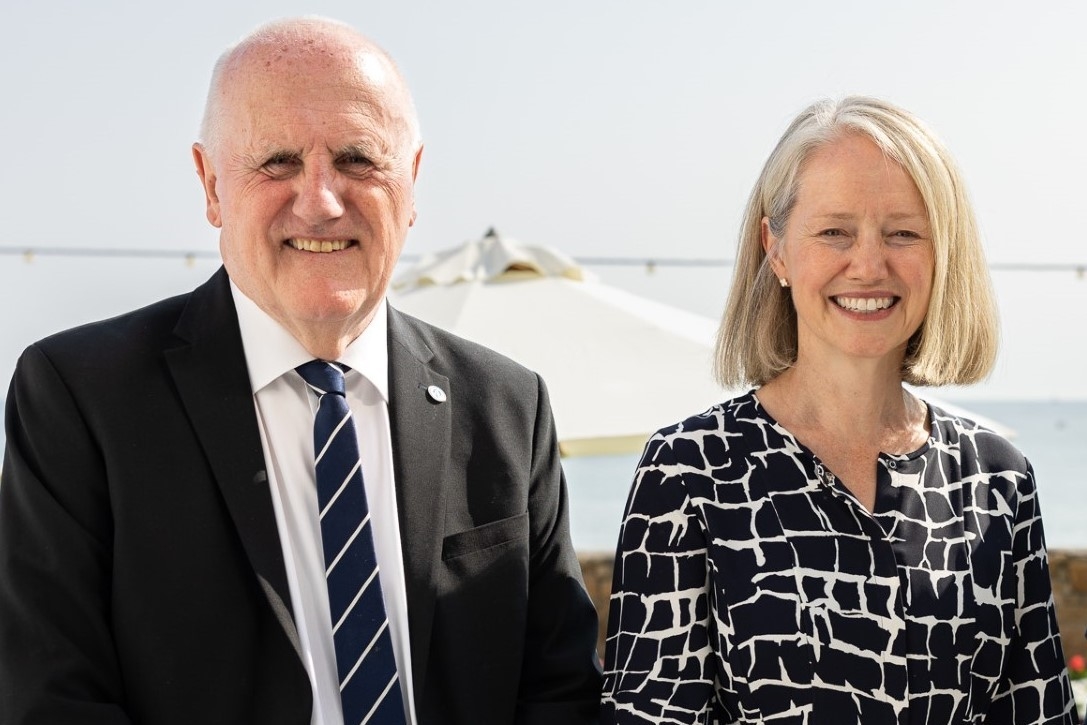


Is the grass always greener on the other side? With both Jersey and Guernsey having recently been shaken by the sudden toppling of their respective leaders, politicians and commentators on both sides have been pondering whether the current system is the right one – and if the other island has it better.
In Guernsey, where matters are decided by committees, a lobby group is calling for a Ministerial system like in Jersey – whereas Jersey’s vote of no confidence last week saw States Members decry the “silos” and “mini Westminster” such a system has created.
Express explores the opposing thoughts...

Ministerial government, where the Chief Minister and a Council of Ministers hold executive power, was introduced in Jersey in 2005 to replace the former committee system, where a president headed up a team of politicians.
It meant more politicians were involved in policy making, and decisions were arrived at by consensus – without a formal scrutiny role.
It's a system that remains in play in Guernsey – but not all are satisfied with it.
In fact, in the wake of a vote of no confidence that saw Guernsey's top politician, then-Policy and Resources Committee President Peter Ferbrache, being thrown out of the top job in December, a local pressure group is saying that the whole system should be replaced... with a version of government just like Jersey.
Known as 'GPEG', the Guernsey Policy and Economic Group recently released a report suggesting that Guernsey is “ready for a different style of government".

Pictured: A Guernsey-based lobby group have suggested Guernsey should adopt a ministerial government model similar to that of Jersey to improve efficiency and unify policy development.
Under their proposals, the island would abolish its current committee-based system and adopt a ministerial government model – with a centralised structure and top-down leadership and decision-making.
The GPEG advocates for a system where a Chief Minister, elected for four years, wields considerable authority, including the power to appoint and dismiss a cabinet of 10 ministers.
This Chief Minister would be primarily responsible for policy decisions, with the support of a Cabinet Office –something that was controversially set up in Jersey under Kristina Moore.
Currently, all Deputies are "equal" in the island's Assembly and all committee members are involved in the task of determining policy and resource proposals.
The report suggested that shifting to a smaller group would increase efficiency, and reduce the workload for individual politicians.
Another benefit of having a smaller group selected by an individual Chief Minister to determine the direction of the island would be reducing the amount of public squabbling, the report hinted.

Pictured: Guernsey and Jersey's ousted Chief Ministers - Peter Ferbrache and Kristina Moore. (States of Guernsey)
“The risk of ministers openly opposing each other publicly is thus greatly reduced, which would strengthen the reputation of the States," the report said.
But, although perhaps rarer, that hasn't necessarily always been the case in Jersey, where former Infrastructure Minister Tom Binet came to blows with outgoing Chief Kristina Moore publicly before bringing a successful vote of no confidence against her.
During last week's vote of no confidence debate, Deputy Barbara Ward stood up to describe Jersey as a “mini Westminster”, with a system that is "disenfranchising" to those outside the Council of Ministers.
Describing the formation of the Cabinet Office as "the last jigsaw piece", Deputy Ward said that the current "UK-style ministerial structure is broken and doesn’t work for Jersey”.

Pictured: Deputy Ward has said that ministerial government is “disenfranchising” and has argued that the committee system used by Guernsey is more “inclusive”.
She said that the "rest of the Assembly are not truly consulted or collaborated with”, adding that the current system is "not truly demographic" and that the committee system seemed more "inclusive".
Deputy Lucy Stephenson – herself an Assistant Minister – said that there were problems too.
She admitted that there are challenges in the “silo structure” of the current ministerial system.
This, she said, but was not due to the people involved, but rather the system as a whole.
In 2020, the former Environment Minister John Young brought forward proposals to review the current “machinery of government” and whether it enables States Members to make an “effective and meaningful contribution to policy development”.
He argued that the current system ministerial system was preventing backbenchers from contributing to policy development.
In the report accompanying his proposals, Deputy Young voiced concerns about the transformation of the island’s democratic Government into “a highly centralised Ministerial government”.
“Since the system was first introduced [in 2005], many people in our community still question whether these changes are right for our small self-governing island. I too share these doubts,” Deputy Young wrote.
Echoing these concerns, former St Helier Deputy Judy Martin said in 2016 that the current set-up wasn’t the one ‘sold’ to islanders in 2005 and isn’t working – and called for a public referendum.
“Currently, Ministers can make ministerial decisions that have a significant impact on Jersey’s population and no-one, neither the general public, ministerial colleagues, nor other States Members not in the executive would be aware this was going to happen, or indeed the reasons for a decision, until (and if) they find it published and then are quick enough to ask the right questions," she said.
She went on to claim that “...many of those who promoted ministerial government stated that it would be more 'efficient and accountable', and that one of the safeguards would be that any Member could propose a vote of no confidence in the Council of Ministers. As we know, in practice this does not happen (or very rarely), and today it is seen as the nuclear option.”
Even just three years into the new system there were concerns.
In 2008, Deputy Gerard Baudains of St Clement said that the system "has not lived up to expectations".
"The quicker decisions and huge savings that were promised have not materialised. Instead, many Ministerial Decisions have been demonstrated to be lacking the rigorous analysis that would have occurred under the previous committee system," he said.
The idea that ministerial government prevents clashes may, to some, seem surprising given Jersey's recent history.
As well as Kristina Moore and Tom Binet's public rowing, thelack of Ministerial consensus over the island's most important capital project, the new hospital, was highlighted in a recent report by Scrutiny, which warned that Ministers' disagreement risked delaying the project even further.
In October, Deputy Moore also took the extraordinary step of publicly expressing her extreme disappointment in her Assistant Minister's decision to throw out a £120m town regeneration plan – leading to questions over how unified Ministers really are.
Analysis of Ministers' voting records by Express also demonstrated a lack of consensus on numerous matters.
So, is the grass always greener? It's hard to say...
Pictured top: The Channel Islands satellite shot (Copernicus Sentinel Data).
INSIGHT: How united is Kristina Moore's Council of Ministers?
Comments
Comments on this story express the views of the commentator only, not Bailiwick Publishing. We are unable to guarantee the accuracy of any of those comments.